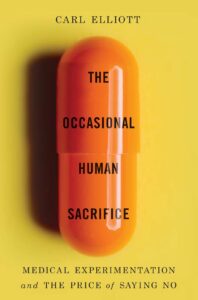From Star Tribune: “Movies such as ‘Erin Brockovich’ depict whistleblowers as heroes who undergo tough times before earning the satisfaction that they’ve benefited humanity. University of Minnesota philosophy professor Carl Elliott says that’s not how it usually goes down.
Elliott, whose book ‘The Occasional Human Sacrifice’ is out next week, knows from experience. Alerted by a 2008 series of articles in the Pioneer Press, written by Paul Tosto and Jeremy Olson (now a Star Tribune reporter), he and others investigated after the suicide of Dan Markingson, a mentally ill man who was part of a U of M study of a powerful drug. That began a frustrating quest for justice, not least for Mary Weiss, Markingson’s mother, that affected relationships with colleagues. (An external review eventually acknowledged flaws in the U’s oversight program.)
. . . Reflecting on the experience led Elliott, 62, to seek other whistleblowers, some as far away as Sweden and New Zealand. What he found is that most were unsatisfied with the results of their labors and that some regretted what they’d tried to do.
We spoke with the Minneapolis man about his book, subtitled ‘Medical Experimentation and the Price of Saying No,’ and how whistleblowers often step into trouble they can’t imagine (the interview has been edited):
Q: You write about the frustration of whistleblowing. But one case you discuss is the Tuskegee Syphilis Study, whose test subjects were unaware they were receiving no treatment. They eventually were compensated. Surely those whistleblowers were successful?
A: If any of the stories in the book had a lasting impact, it’s that one. But it took a long time [four decades]. The really interesting thing to me about Tuskegee is the way it is taught in medical schools, which put a much more optimistic, positive spin on it than it deserves. The researchers responsible for it were never punished. In fact, they were honored. Many of them went to their graves convinced that they had done nothing wrong.
. . . Q: Many whistleblowers you met left the organizations on whom they blew the whistle. Did you think about leaving the U?
A: I probably should have. I didn’t feel as if I could leave or wanted to leave while the Markingson case was still alive because it would have felt like giving up. Afterwards, you become so contaminated with the experience of being a whistleblower or dissenter that it makes it difficult to leave. You become toxic. No one wants to be around you. This is what John Pesando [a former researcher at Seattle’s Fred Hutchinson Cancer Research Center who attempted to expose alleged abuses of patients there] says: ‘Once you blow the whistle, everybody is a little wary of you because they think, “When are you going to blow the whistle in my direction?”’

***
Back to Around the Web











